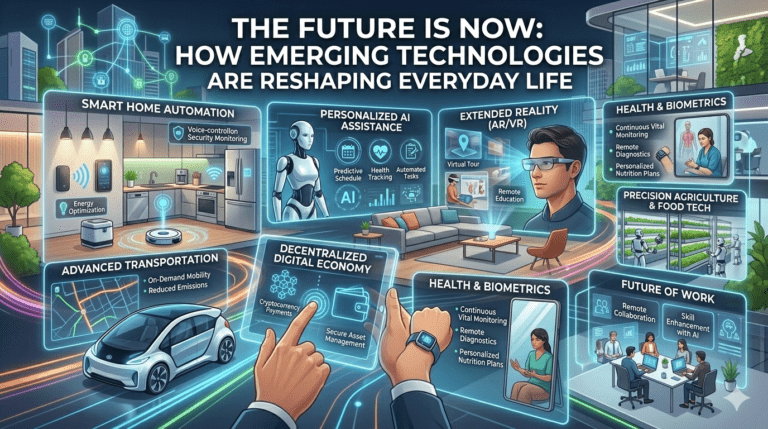
|
Getting your Trinity Audio player ready...
|
Quantum computing, often considered one of the most groundbreaking technological advancements of the 21st century, promises to revolutionize how we process information. While traditional computers operate using binary bits (0s and 1s), quantum computers leverage the principles of quantum mechanics, enabling them to solve complex problems at an unprecedented speed. The transformative potential of quantum computing spans across various industries, from healthcare and cybersecurity to finance and artificial intelligence.
What is Quantum Computing?
At its core, quantum computing operates on the principles of quantum mechanics, which govern the behavior of particles at the atomic and subatomic levels. Unlike classical computers that use bits, quantum computers utilize quantum bits or qubits. The key difference is that qubits can exist in multiple states simultaneously (thanks to a property called superposition), allowing quantum computers to perform many calculations at once.
Additionally, quantum computers leverage entanglement, a phenomenon where qubits become interconnected, meaning the state of one qubit can affect the state of another, even if they are far apart. These unique features allow quantum computers to process complex data and solve problems that would be nearly impossible for classical computers to handle.
How Quantum Computing Works
Quantum computing uses two primary principles of quantum mechanics:
- Superposition: Classical bits represent either a 0 or a 1. In contrast, qubits can represent both 0 and 1 at the same time, thanks to superposition. This enables quantum computers to process a vast number of possibilities simultaneously.
- Entanglement: When qubits become entangled, they share information regardless of their physical separation. Changes in the state of one qubit can instantaneously affect the state of its entangled partner, enabling faster and more complex calculations.
These two principles enable quantum computers to perform multiple calculations simultaneously, exponentially increasing processing power.
Quantum Computing vs. Classical Computing
Quantum computing and classical computing fundamentally differ in how they process information. Classical computers are limited to performing one calculation at a time in a sequential manner, whereas quantum computers can perform many computations in parallel due to superposition.
For example, while a classical computer might take years or even centuries to solve certain complex problems, quantum computers can potentially solve them in minutes. This capacity makes quantum computers ideal for tasks that require vast amounts of data to be processed and analyzed.
Key Applications of Quantum Computing
- Cryptography and Cybersecurity Quantum computing has the potential to break many of the cryptographic systems currently used to secure data. Classical encryption methods, such as RSA, rely on the difficulty of factoring large prime numbers. Quantum computers, particularly using Shor’s algorithm, could solve this problem exponentially faster, rendering many current encryption methods obsolete.
However, quantum computing can also create new, more secure encryption methods, such as quantum cryptography, which uses the principles of quantum mechanics to provide virtually unbreakable encryption.
- Drug Discovery and Healthcare In the field of drug discovery, quantum computing can simulate molecular structures at an atomic level, enabling researchers to analyze how molecules interact and predict the behavior of new drugs more accurately. This will significantly accelerate the development of new medications and therapies, especially for complex diseases like cancer and Alzheimer’s.
Traditional computers struggle to simulate molecules and chemical reactions due to the vast number of variables involved. Quantum computers, however, can process these variables simultaneously, offering breakthroughs in drug discovery, personalized medicine, and even the development of new materials.
- Artificial Intelligence and Machine Learning Quantum computing can enhance machine learning algorithms by processing vast datasets more efficiently. While classical computers are limited by their sequential processing power, quantum computers can perform operations in parallel, making it possible to analyze and learn from massive data sets quickly.
This will lead to advancements in AI and machine learning, enabling more sophisticated models for tasks such as language processing, image recognition, and predictive analytics. Quantum-enhanced AI could revolutionize industries like healthcare, finance, and autonomous vehicles by providing faster and more accurate decision-making.
- Optimization Problems Quantum computers excel at solving optimization problems, which involve finding the best solution from a vast number of possibilities. These problems are common in industries such as logistics, finance, and energy, where companies must optimize supply chains, investment portfolios, or power grids.
For instance, airlines could use quantum computing to optimize flight schedules, minimizing fuel consumption and maximizing efficiency. Similarly, financial institutions could optimize investment strategies, balancing risk and return in a more precise manner than classical computers allow.
- Climate Modeling and Environmental Science Predicting and mitigating the impacts of climate change requires the analysis of complex and chaotic systems. Quantum computers can model these systems more accurately, providing insights into how various factors, such as ocean temperatures, atmospheric conditions, and carbon emissions, interact. This can help scientists develop better strategies for combating climate change, improving weather forecasting, and managing natural resources.
- Financial Modeling The financial sector relies on complex models to assess risk, predict market trends, and optimize portfolios. Quantum computing could enhance the accuracy of these models, allowing for more precise financial forecasts and risk assessments. Quantum computers can also perform faster simulations of financial markets, helping institutions make more informed decisions in real-time.
Challenges and Limitations of Quantum Computing
Despite its potential, quantum computing faces significant challenges that must be overcome before it becomes widely accessible:
- Hardware Stability: Qubits are highly sensitive to environmental interference, leading to errors in calculations. Quantum computers must operate at extremely low temperatures, and even then, maintaining stable qubits is a major challenge. Researchers are working on quantum error correction to mitigate these issues, but building stable, error-free quantum computers is still a work in progress.
- Scalability: Building quantum computers with a large number of qubits is challenging. Current quantum computers only have a limited number of qubits, which restricts their computing power. Scaling up the number of qubits while maintaining stability and reducing errors is a critical hurdle.
- Cost: Quantum computers are currently expensive to build and maintain. The technology requires specialized infrastructure, including cryogenic cooling systems, which limits access to only a few research institutions and tech companies. As the technology advances, however, costs are expected to decrease.
- Limited Algorithms: While quantum computers have demonstrated superiority in certain areas, such as factoring and optimization, the development of quantum algorithms is still in its infancy. Many of the applications for quantum computing are theoretical at this stage, and more research is needed to create practical algorithms for a wider range of problems.
The Future of Quantum Computing
As quantum computing matures, it will unlock new possibilities across a variety of industries. Companies like IBM, Google, and Microsoft are leading the charge in developing quantum hardware and software. Quantum computing could become mainstream within the next few decades, fundamentally transforming fields like medicine, AI, cryptography, and materials science.
With the potential to solve problems that were once thought to be unsolvable, quantum computing will be a driving force behind the next wave of technological innovation. The combination of quantum computing with other emerging technologies, such as artificial intelligence and blockchain, could further accelerate the pace of innovation, creating new opportunities and challenges for businesses and society alike.
Conclusion
Quantum computing is set to revolutionize the technological landscape, offering unprecedented processing power and the ability to solve complex problems far beyond the capabilities of classical computers. While challenges remain in terms of hardware stability, scalability, and cost, the future of quantum computing is promising. As advancements continue, quantum technology will have a profound impact on industries such as cybersecurity, healthcare, artificial intelligence, and climate science, transforming the way we live and interact with the digital world.






